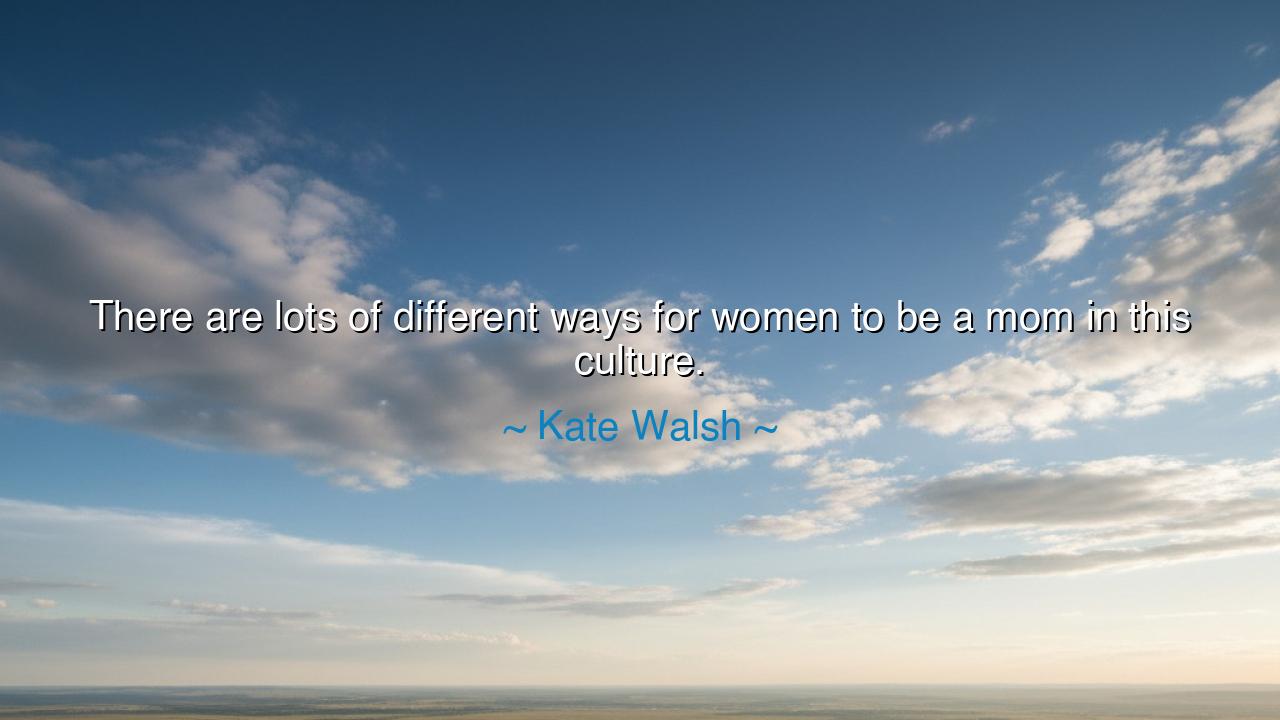
There are lots of different ways for women to be a mom in this






In the thoughtful and compassionate words of Kate Walsh, there lies a truth both modern and timeless: “There are lots of different ways for women to be a mom in this culture.” This is no mere statement of social observation — it is a hymn to the many forms of motherhood, to the boundless ways love can manifest through care, creation, and nurture. In this age, as in ages past, the role of the mother has evolved beyond blood and tradition; it has become a living symbol of adaptability, compassion, and resilience. Walsh’s words remind us that motherhood is not confined to one path — it is a spirit, a calling, and a way of giving life, whether through body, through heart, or through the hands that lift others.
Kate Walsh, an actress known for portraying strong, complex women, spoke these words in the modern context of shifting social expectations. The ancient image of the mother — bound to hearth and home, defined only by birth — is being transformed. In her insight, we hear the voice of a generation that recognizes that motherhood is not defined by biology alone. A woman may give life through adoption, through mentorship, through art, through leadership, through nurturing the wounded or the lost. Each act of care, each gesture of guidance, is an echo of that original maternal power — the sacred force that brings forth, protects, and sustains life.
The ancients understood the vastness of the maternal principle. In Greece, Demeter was not only the goddess of birth but of harvest — her motherhood extended to the fields, to the people, to the earth itself. In Egypt, Isis wept for her slain husband and gathered his body to restore him to life, becoming the archetype of compassion and endurance. These goddesses were not mothers merely by giving birth, but by embodying the essence of creation and preservation. Kate Walsh’s words carry this same wisdom into the present age: that motherhood, in its truest sense, is an energy that transcends gender, time, and tradition — it is the power to sustain and uplift life in all its forms.
In our world today, this truth takes many forms. There is the woman who raises a child born of her body. There is the woman who fosters or adopts, giving a home to the lost. There is the teacher who nurtures young minds, the nurse who tends to the suffering, the artist who gives birth to beauty, and the friend who steadies another’s trembling heart. Each one, in her own way, carries the mantle of motherhood. Culture may change, but the need for nurturing never does. Walsh’s insight is thus not just an observation of society’s diversity, but a reminder that the divine act of mothering is not limited to circumstance — it is a choice, an expression of love repeated through infinite forms.
Consider the story of Clara Barton, founder of the American Red Cross. She was never a mother by blood, yet she became one to soldiers and strangers alike. On the battlefield, she bound wounds and comforted dying men, earning the name “Angel of the Battlefield.” Through her courage and compassion, she gave birth to hope amid destruction. Barton’s life proves what Kate Walsh’s words proclaim: that motherhood is not a title given, but a force lived — the will to nurture where others despair, to heal where others harm, to protect even those not one’s own.
And yet, Walsh’s quote carries a gentle challenge as well. She reminds us that culture must learn to honor all forms of motherhood equally, without judgment or hierarchy. Too long have societies praised only one narrow image — the woman defined solely by her ability to bear children — while overlooking those who mother through other means. In doing so, we dishonor the fullness of the feminine spirit, which expresses care in countless ways. To honor all mothers — biological or chosen, literal or symbolic — is to honor the diversity of love itself. For love, like water, takes the shape of the vessel it fills.
Thus, the lesson is both clear and sacred: motherhood is not a single path, but a living tapestry woven from many threads of devotion. Whether through childrearing, teaching, healing, creating, or protecting, every act of care expands the definition of what it means to mother. Let no one diminish the power of those who love deeply, give selflessly, and nurture life in any form. For the essence of motherhood lies not in the womb, but in the heart that chooses to give life again and again, in every gesture of compassion and strength.
And so, when Kate Walsh speaks of “different ways for women to be a mom,” she is speaking the language of the ancients renewed — the eternal truth that love itself is creation. Her words are a call to gratitude and recognition: that in every woman who builds, comforts, teaches, or heals, the spirit of the mother is alive. Let us, then, celebrate all forms of motherhood, and learn from their courage, their tenderness, and their unending capacity to give. For as long as there are hearts that nurture, the world will never fall into darkness — it will always, somehow, be born again.






AAdministratorAdministrator
Welcome, honored guests. Please leave a comment, we will respond soon